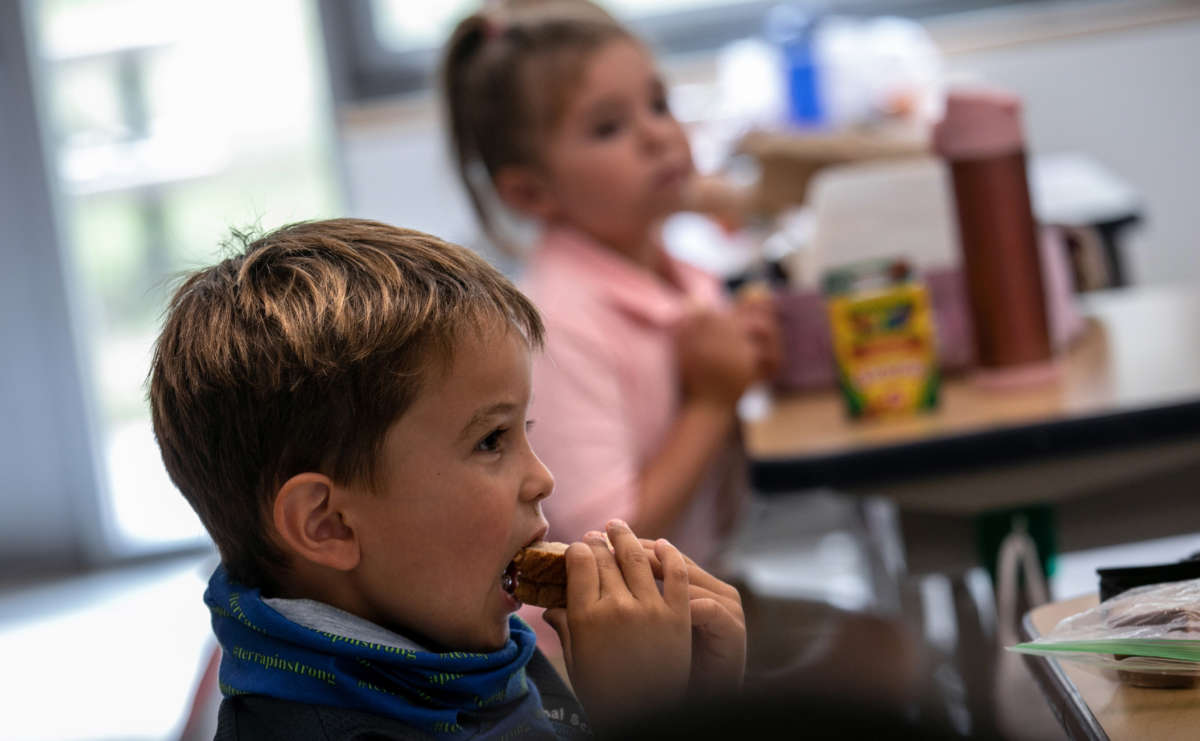Honest, paywall-free news is rare. Please support our boldly independent journalism with a donation of any size.
Sen. Bernie Sanders (I-Vermont) and Rep. Ilhan Omar (D-Minnesota) introduced legislation last Friday that would create a permanent universal school meals program to provide children with free breakfast, lunch, dinner and a snack, thus eliminating school lunch debt once and for all.
The Universal School Meals Program Act of 2021 would expand and make permanent a program recently extended by the United States Department of Agriculture (USDA) to provide universal free lunches through the 2021-2022 school year. It would provide food for all children, regardless of their family income levels, free of charge.
Sen. Kirsten Gillibrand (D-New York) and Rep. Gwen Moore (D-Wisconsin) joined Omar and Sanders in introducing the bill, which has nine co-sponsors in the Senate and 26 cosponsors in the House. It also has the support of over 360 education, youth and food-related organizations, says a Sanders press release.
“In the richest country in the world, it is an outrage that millions of children struggle with hunger every day,” said Sanders in a statement. “Every child deserves a quality education free of hunger. What we’ve seen during this pandemic is that a universal approach to school meals works. We cannot go backwards. I am proud to introduce this legislation alongside my colleagues to ensure no student goes hungry again.”
The USDA program was established to help all children receive breakfasts and lunches through the pandemic, but the current extension is intended only to ease the transition back to in-person schooling.
Before the pandemic, free or reduced meals were largely limited to children whose family incomes were below 185 percent of the federal poverty line. Those families also had to fill out complicated paperwork to qualify. Still, tens of millions of kids benefit from free and reduced lunch programs, and many would go hungry without them.
“Without a permanent solution to provide free meals to all students, schools will eventually have to revert to the complicated myriad of paperwork and programs that leave out or discourage too many children from accessing meals throughout the day,” read the press release on the bill.
Sanders and the Democrats want to eliminate some of the hurdles for free meals for children by making it permanent and universal. They introduced the bill with the goal of “ensuring all students have access to nutritious meals without overwhelming barriers such as stigma, burdensome paperwork,” or threats to parents to have their children taken away, the press release reads.
Indeed, some schools have shamed and threatened families and children with school lunch debt — “a gobsmackingly ghoulish phrase that shouldn’t exist,” as Natalie Shure wrote for The New Republic. Schools have marked children with stamps drawing attention to their lunch debt, sicced debt collections agencies on families that owe lunch money, and, as in the case of one Pennsylvania school, threatened to send kids to foster care if they owe more than $10 in lunch debt.
New York City schools have in the past tried implementing a free lunch program and the results were positive: A report examining the impacts of the program on the city’s middle schools found that it increased test scores, presumably helping kids to retain their education better. And schools that have implemented universal free meals, under a USDA program called Community Eligibility Provision, end up saving money in the long run without sacrificing the nutritional quality of the food.
A permanent universal free meals program could also help stimulate local economies. The bill would direct schools to get at least 25 percent of their food from local sources, which the bill’s authors argue could provide an “enormous” investment in rural communities.
A terrifying moment. We appeal for your support.
In the last weeks, we have witnessed an authoritarian assault on communities in Minnesota and across the nation.
The need for truthful, grassroots reporting is urgent at this cataclysmic historical moment. Yet, Trump-aligned billionaires and other allies have taken over many legacy media outlets — the culmination of a decades-long campaign to place control of the narrative into the hands of the political right.
We refuse to let Trump’s blatant propaganda machine go unchecked. Untethered to corporate ownership or advertisers, Truthout remains fearless in our reporting and our determination to use journalism as a tool for justice.
But we need your help just to fund our basic expenses. Over 80 percent of Truthout’s funding comes from small individual donations from our community of readers, and over a third of our total budget is supported by recurring monthly donors.
Truthout’s fundraiser ended last night, and we fell just short of our goal. But your support still matters immensely. Whether you can make a small monthly donation or a larger one-time gift, Truthout only works with your help.
